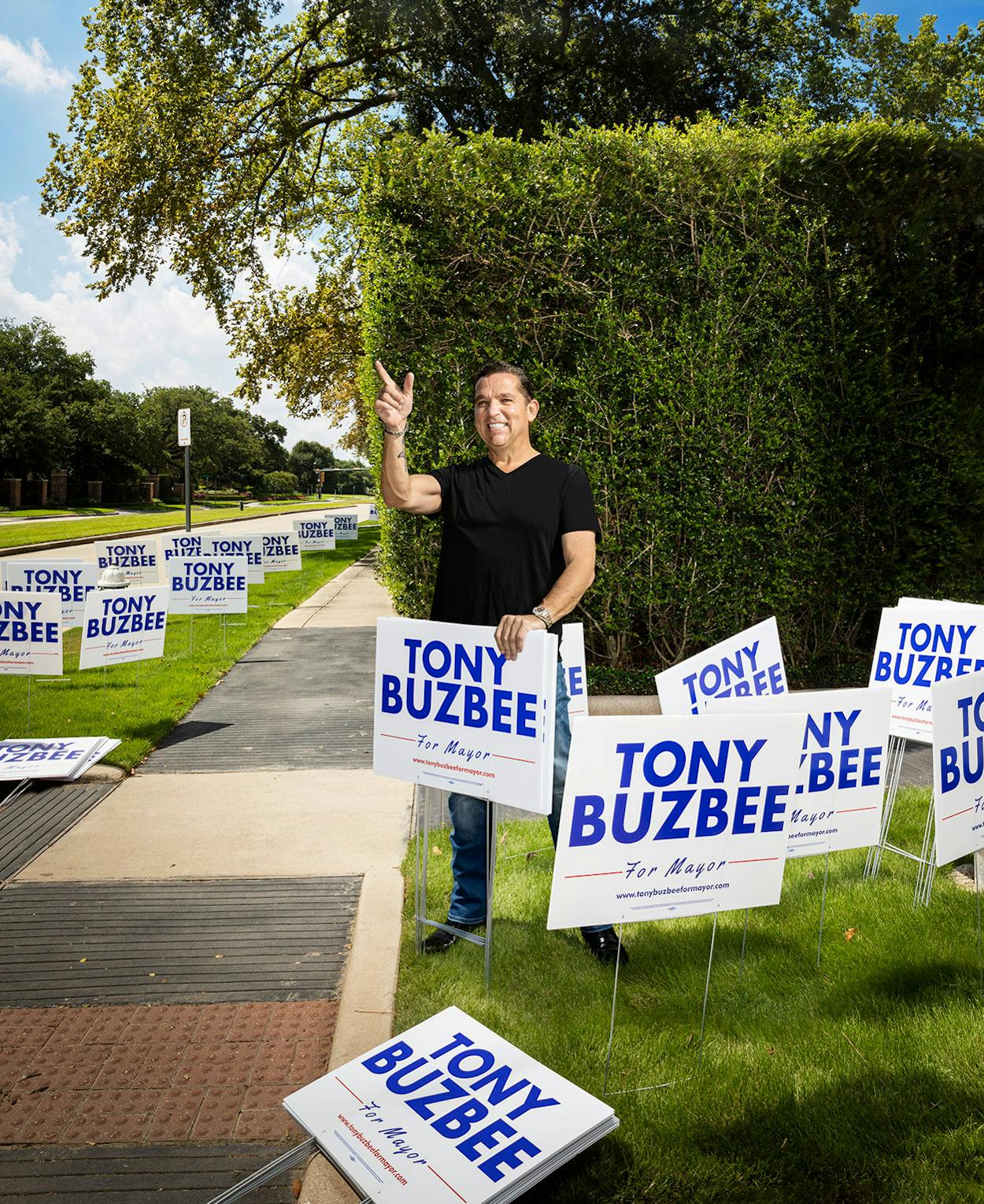The view from a luxe office on the seventy-third floor of Houston’s tallest building might give anyone visions of dominance, and it’s easy to understand why Tony Buzbee wouldn’t be immune. He grew up wearing cheap jeans and off-brand shoes in tiny Atlanta, Texas, in the state’s northeast corner. Through brains and grit and sharp elbows, he transformed himself into one of the country’s richest and most famous personal injury lawyers, defending, so he likes to say, working people against greedy corporations. Nowadays Buzbee can look down on some of those companies’ headquarters from his aerie in the Chase Tower. The office so high that to reach it requires a change of elevators. The office with gleaming door handles in the shape of sharks.
“I’m a shark, yeah,” Buzbee tells me in a nasal, high-pitched East Texas twang you don’t hear much anymore. “The great white controls the ocean. We go for it. No fear.” As he speaks, the sunlight flooding his office is dazzling, almost blinding, like heaven should be. His very name—Buzzzzzbeeeee—seems almost divinely fitting, given the coiled energy he radiates.
He is a compact, pugnacious man of 51, with wavy brown hair just graying at the temples. When he stands up from his giant mahogany desk, beaming incandescently with hand outstretched, it’s like he’s been waiting for you all his life. Buzbee favors Texas trial lawyer–chic attire: on this day a custom-made, royal-blue linen jacket—Brioni—jeans, a black T-shirt faded just so, custom-made boots, a gold watch sprinkled with diamonds, and a few braided leather bracelets, which direct the eye to the shark tattoo on his forearm. Buzbee’s eyes, just a shade paler than the Houston sky on a clear day, look diabolical only if you stare really closely.
“Am I what you expected?” he asks, and it’s a reasonable question, because most of what people know about him comes from media accounts spanning the past year or so that link Buzbee to: (a) a drunken blonde with the central-casting name of Lindy Lou Layman who had to be ejected from a party at his $14 million River Oaks mansion by the Houston Police Department after destroying an estimated $300,000 worth of art, including two Warhols; (b) the purchase of a $600,000 World War II–era tank that either did or did not storm the beach at Normandy but was certainly squatting in front of said mansion, to the delight of gawkers and the consternation of his more reserved neighbors; and (c) a burglary at the same mansion, during which an estimated $21 million worth of art, technology, guns, and jewelry was stolen. “But for the fact that my weapon misfired, I would have shot one of them,” Buzbee posted on Facebook later that same day.


Despite these and other bumps in the road, just about anyone would assume that Tony Buzbee has reached the stage in life where he has won just about everything he’s ever wanted. That would include 30 to 40 percent of the billions of dollars he’s won against companies like BP and Ford; his image on the cover of the New York Times Magazine, in 2010; Lawyer of the Year honors from Texas Lawyer, in 2015; and a stint on the Texas A&M Board of Regents. He’s also got that Tudor-contemporary mansion on River Oaks Boulevard, the flashiest street in a ’hood of flashy streets. The Ferrari, the Mercedes McLaren, and a Mercedes G-Wagon, along with a full-time driver named Raf. Renoirs and Matisses that were not stolen during that highly publicized break-in. A big jet with a shark painted on the tail.
He has ostensibly been there and done that when it comes to bad-boy behavior. Forget (or try to) his $1 million 2017 Christmas party benefiting Hurricane Harvey relief and featuring Buzbee onstage—just behind Snoop Dogg—receiving some scorching dances. Now he has a lovely young girlfriend, Frances, from Galveston’s old-line, if infamous, Moody family. He’s a doting dad to four kids, two of them out of the house (he divorced their mother, Zoe, more or less amicably, in 2017). He’s even newly svelte, having lost 67 pounds after the divorce by, he says, “eating only two bites of everything.”
But he wants more. Specifically, he wants to replace Houston mayor Sylvester Turner in the November 5 election. That race is nonpartisan, which suits Buzbee, who considers himself politically nonbinary. He ran unsuccessfully for the Texas House as a Democrat in 2002, served as chair of the Galveston County Democratic party, and supported Bill Clinton for president. He also supported Republican governor Rick Perry and served as Lieutenant Governor David Dewhurst’s debate coach. He hosted a 2016 fundraiser for Donald Trump and wrote a six-figure check to his inauguration committee.
Since he announced his candidacy last October, Buzbee has, as of August, set aside $7.5 million to self-fund his campaign (and expects the total to rise to $10 million). He has promised to donate his mayoral salary of $236,000 to charity. He has hired the high-priced political strategist who helped Ted Cruz squeeze past Beto. He employs a fancy analytics team that can practically look at your Facebook profile and figure out whether you like granola or Frosted Flakes for breakfast.
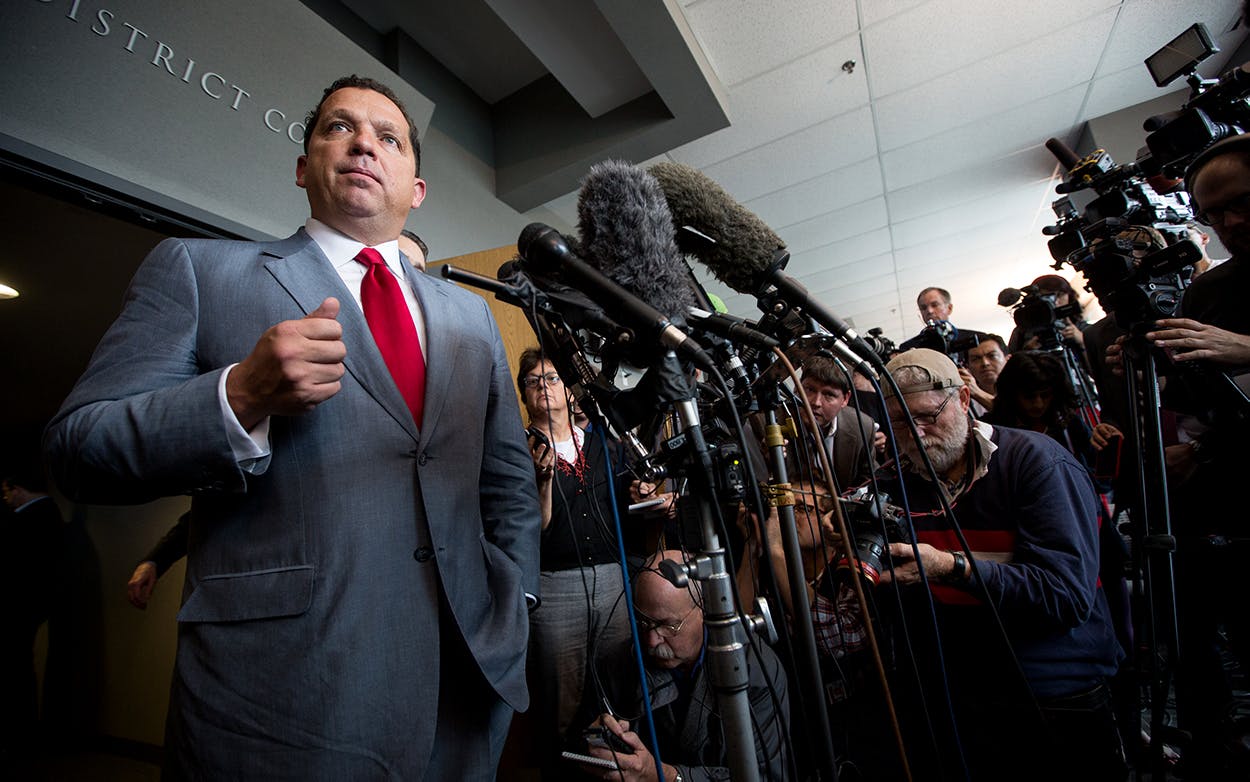
“I’m gonna dramatically change this city,” Buzbee promises me, with the kind of certainty that he displays to juries. Leaning back in his office chair, he starts ticking off his Houston to-do list, which shows that while he has never held political office, he’s sure as hell done his homework. Houston needs all-day pre-K, for starters. He will fix the damned potholes so that you can drive without spilling your drink all over your lap, as he did in a campaign video with a cup of Chick-fil-A sweet tea. He has a plan for stray animals, too. “We can’t even get an accurate count,” he says, his voice inching upward toward exasperation.
Buzbee shifts into a more positive aria about the need for 5G broadband to keep Houston innovative. Then he grows as solemn as a funeral director. “There’s our incredible problem with crime,” he says, as if it’s almost beyond repair. As the current occupant of the White House has shown, and as Buzbee certainly knows, one of the surest ways to whip up support in certain quarters is to bemoan the lack of law and order—and never mind that Houston’s crime rate is down. Buzbee looks out toward the coastline of his desk and reaches for a paperback. He holds it up as Exhibit One, The COMPSTAT Paradigm: Management Accountability in Policing, Business and the Public Sector. He has studded the pages of this classic policing tome—the ideas behind which were applied in Baltimore and eviscerated in the HBO series The Wire—with paper-clip bookmarks, a nice touch that suggests, more or less, that he’s read it. “We should have no tolerance for the smallest of crimes,” Buzbee insists.
He has already begun to make Houston great again with his weapon of choice: lawsuits. Buzbee filed one in April against Turner after the mayor put his own face on hurricane safety billboards around town. (The suit, which claimed the billboards were a campaign-finance violation, was dismissed, but Buzbee scored points with name recognition.) Another civil action, filed in May and still pending, alleged fraud in the city’s post-Harvey rebuilding program.
If the lawsuits are largely publicity stunts, they aren’t the only weapons in Buzbee’s headline-grabbing arsenal. He’s also mastered the currently fashionable art of being strategically outrageous. In the first official press conference of his campaign, he illustrated his focus on city hall corruption by bringing in a wheelbarrow full of aromatic cargo. “Something stinks at city hall, and it’s not this horse manure,” he said. (Headlines followed.) After Mayor Turner gave his rosy annual State of the City address this past May—more cops, more jobs, his plan for 5G—Buzbee followed with his own “American carnage” response in the same downtown hotel. (“We have a major crime problem. Houston is one of the most dangerous cities in the country . . .”)
Sitting in that plush, serene office on one of the last pleasant days of spring, I ask Buzbee if he isn’t going dirty just a little early. His eyes gleam. He fixes me with a grin that reminds me of a cartoon character sharpening kitchen knives. “I don’t wait till the last minute,” he says.

Veteran politicians once had the luxury of ignoring fringe candidates. That was before fringe candidates started getting elected, or nearly elected, to major offices. He Who Need Not Be Mentioned is not the only one. As trust in government has plummeted and the public square has moved to the passive-aggressive paradise of social media, voters have turned more and more to unconventional candidates who offer simple answers to complex problems and promise to upend the status quo. Kris Kobach, in Kansas. Roy Moore, in Alabama. Greg Brockhouse, a hotheaded mouthpiece for San Antonio’s firefighters’ union, narrowly lost that city’s mayoral race to incumbent Ron Nirenberg in June. You can also see these types around the world: Matteo Salvini, in Italy; Boris Johnson, in the UK. Many share certain beliefs: That everyone is entitled to his or her own facts. That plutocrats can pass for populists. That there is no such thing as bad publicity. That personal scandals, whether sexual or financial, don’t matter. That office seeking is as much about brand extension as public service.
Tony Buzbee disputes his inclusion in this category—and especially any comparison to the president. “I didn’t get a million dollars from my father. I served as a Marine. I’ve worked on behalf of working people all my life. I don’t see how people would reasonably compare me to anybody who’s run for office.” That sense of uniqueness is, of course, something Buzbee certainly shares with . . . other unconventional candidates.
National and local events—and his own great white shark ambitions—have conspired to shift Buzbee from the political margins to a bona fide political threat. Respected pollsters and political operatives say privately that while Buzbee is a long shot, he does have a narrow path to victory.
The incumbent, Turner, would seem unassailable, on paper. Crime rates have declined enough to push Houston down to twenty-second among U.S. cities, between Wichita, Kansas, and Albuquerque. The U.S. Labor Department in July ranked greater Houston’s job gains second only to those of New York City. Turner has kept his promise to resolve a pension issue that threatened to bankrupt the city. And he has proposed a plan to expand public transportation in a city that is at least three decades behind any others of comparable size.
But Turner has issues. Recovery from Harvey has been slow, which has especially hurt his standing in poor black neighborhoods where he’s long depended on loyal turnout. “He’s underwater in his own community,” says Bob Stein, a Rice University professor and longtime pollster.
Turner’s opponents have also accused him of cronyism, mismanaging public funds, and tolerating corruption. Big-time contributors have benefited from big-time city projects—in particular an airport expansion that has little to show but a surfeit of consultants, according to an investigation by the Houston Chronicle. He certainly hasn’t brought his A team to city government: Turner’s former press secretary was indicted on two criminal charges last year after the media revealed that she was running a private business from her office at city hall. (She pleaded guilty and received a year of probation.) Not surprisingly, detractors have raised concerns about how the billions of state and federal dollars coming in for hurricane recovery will be allocated.
Critics also allege the mayor has shown a vindictive streak toward those who do not fall in line at city hall and toward city contractors who are reluctant to hire job applicants he recommends.
Finally, Turner has suffered politically during his ongoing battle with the city’s firefighters, who are demanding pay parity with the police. Turner’s supporters say he showed courage by denying their demands, citing already stretched city finances and the lower level of peril that firefighters face when compared with police. (Firefighting is the nation’s twenty-fourth-most-dangerous occupation, according to data from the U.S. Bureau of Labor Statistics. Police work ranks eighteenth. Those workers you see on Deadliest Catch? They’re number one.)
But if Turner got the pay policy mostly right, he flubbed the politics. He gambled that voters would see things his way, but in a 2018 referendum, they really, really didn’t. The vote went to the firefighters, and the bitterness remaining—and an upcoming court fight—will bleed into the election.
When you add up his pluses and minuses, it’s clear that Turner has given any sophisticated, well-financed opponent an opening to paint him as a hack and suggest that it’s time to Drain the Swamp. And that’s just what Turner’s major rivals, including Buzbee, are doing.
Turner’s most unsurprising challenger is Bill King, the former mayor of the Houston suburb of Kemah—a moderate who came within four thousand votes, or a hair under 2 percent, of beating Turner in a runoff in 2015. King has the chiseled good looks and easygoing manner of a citified Marlboro Man, but his signature issue last time—resolving Houston’s pension crisis—was vaporized by the mayor’s resolution of the problem. Like Buzbee, King is accusing Turner of corruption, but as a former member of the law firm that had the city contract to collect back taxes, he will be open to the same pay-to-play charges as Turner.
Also running is city councilman Dwight Boykins, an African American and a Democrat who initially looked like an alternative for black voters frustrated by the mayor. But Boykins probably tanked his campaign last June when, at a youth advocacy summit, he reportedly urged the teenage girls in the audience to “keep their legs closed” to stay pure in order to land a husband. The hashtag #BoycottBoykins blew up overnight.
Sue Lovell, a six-year city council veteran and LGBTQ community leader, could damage the mayor’s longtime liberal and gay support. “Buzbee should send her flowers,” cracks one seasoned observer of Houston’s political scene.
The immediate goal for every challenger is to finish second in the November 5 election and join Turner in the runoff. Because the race is nonpartisan—essentially a free-for-all—if no candidate wins a majority in the general, the top two vote-getters must fight it out in a second vote a month later. So the current situation is this: three traditional liberals versus King the moderate—with Tony Buzbee the wild card.
In Buzbee’s calculus, the left takes care of itself, with Boykins and Lovell siphoning enough support away from Turner to keep him from getting a majority. Buzbee sees King as his only competition on the right, and the funding reports show a decided advantage to Buzbee: as of the last report in July, he had $5 million cash on hand, while King had about $300,000. “I’m not gonna talk about Bill King,” Buzbee tells me, with a flick of his wrist. “I don’t punch down.”
While Turner’s team is publicly treating Buzbee as a minor annoyance, privately they are taking him seriously—as well they should. Buzbee, after all, doesn’t have to depend on campaign contributions to get his way. And, he says, “I’ve got some surprises up my sleeve.”
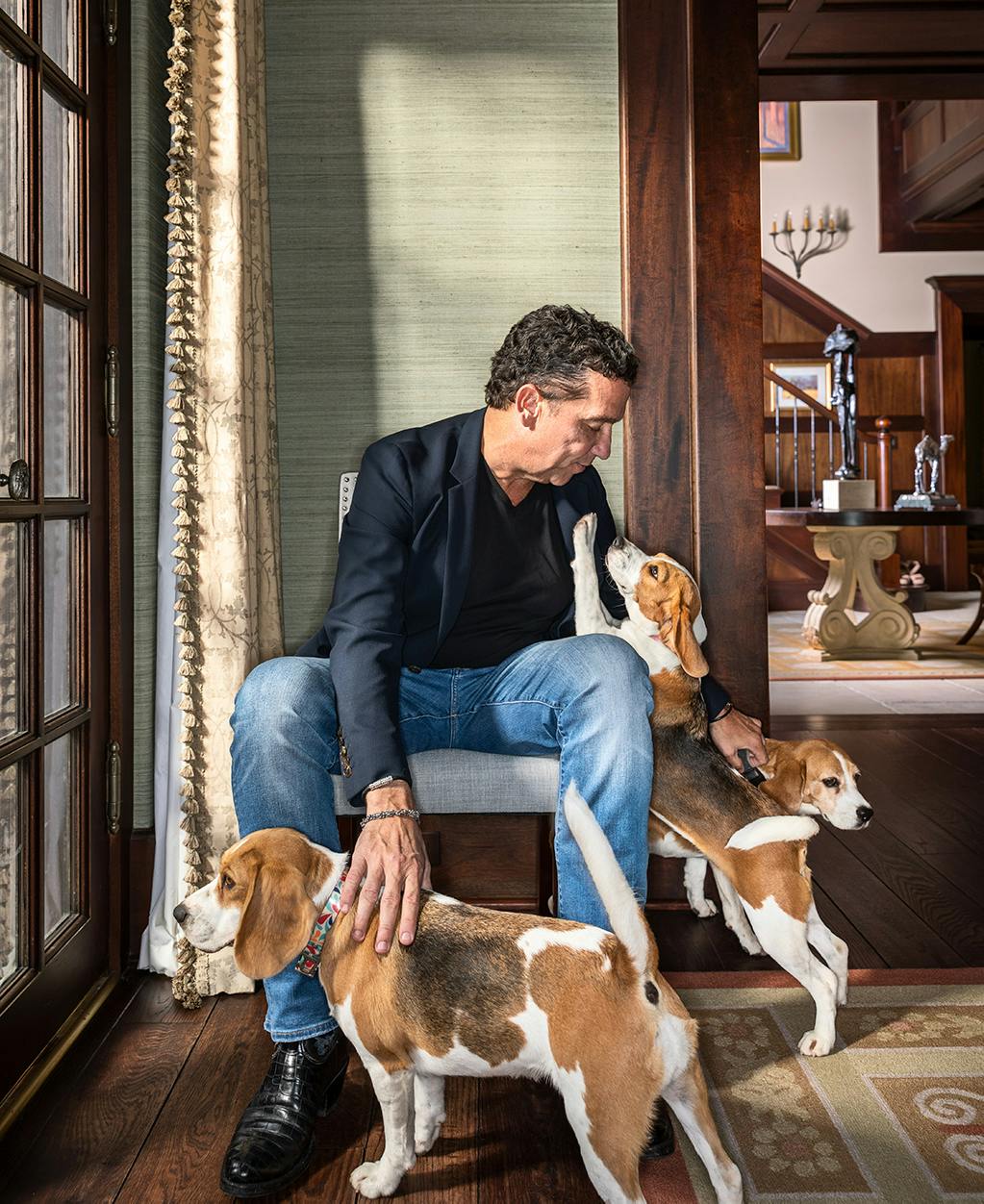
Unlike many political candidates who grew up soft but play a tough guy on stage, Buzbee comes by his combativeness authentically. Atlanta is a town of about four thousand people near the Arkansas border. Buzbee lived on a farm where there were chores before and after school. His father, Bobby Glenn, was a butcher at a local grocery, and his mother, Patti, drove a school bus. Young Tony shared their 1,200-square-foot home with two sisters and a brother. Buzbee has said that his father would fight at the drop of a hat—and would drop the hat himself. Family members suggest that Tony might have been the object of that quick temper on more than a few occasions. Patti puts it this way: “His dad was really hard on him. Tony didn’t have it easy.”
He was a smart kid but was easily bored, and he developed a deep ambivalence toward those with more money. “Of course he wanted better, but that was because most of his friends had better,” Patti explains. “They had the camper. They had vacations. We didn’t.” Buzbee could have become one of the thousands of small-town kids who end up going nowhere, but he was a natural strategist, understanding almost from birth that his first objective was to get out of Atlanta. In the sixth grade, he hung a list of goals above his bed that included going to college and joining the Marine Corps, and he stuck to them, winning an ROTC scholarship to A&M and then, after graduating with a psychology degree, serving in the Marines in the Persian Gulf and Somalia. Those experiences showed Buzbee that he could excel in the larger world.
He also knew that he was done with cheap clothes and living paycheck to paycheck. “I wanted to make money,” Buzbee told a reporter from the Galveston County Daily News in 2013. “Real money.” He happened to notice a fellow Marine’s LSAT prep book one day when he was on active duty. Buzbee worked a few problems and made a decision. His next stop was the University of Houston law school, in 1994, where he triumphed again, as managing editor of the law review and the winner of state and regional mock-trial championships. He was determined to trounce his classmates: Buzbee worked 24/7, chatting up his teachers and mastering preparation and strategy with a speed and decisiveness that led to his graduating summa cum laude in 1997, second in his class.
After a federal clerkship, Buzbee landed a job as an associate with one of the best litigation firms in Houston, Susman & Godfrey. He was on a path to the kind of cushy, secure future that many of his top-ranked classmates now enjoy: the house in River Oaks, the country club memberships, the best private school for the kids. In 1991 Buzbee had married his A&M sweetheart, a willowy blonde named Zoe Benson, from Galveston, and their first child, a daughter, had been born the same year he graduated from law school.
But after just a year as an associate, Buzbee had had enough. “I got tired of making Steve Susman and Lee Godfrey rich,” he says. “My dad was a butcher. I wanted to enjoy the fruits of my labor.”
In the late nineties, there was no better place for a shrewd, ambitious personal injury lawyer than the terrain between Houston and Galveston. Along with the sprawling ports located in both cities, there were scores of petrochemical plants and refineries. That meant lots of noxious, potentially harmful emissions. Mysterious leaks seeping into the groundwater. Superfund sites. Frequent explosions. Out on the Gulf of Mexico and beyond, there was even more opportunity: the potential for myriad admiralty cases, which, thanks to the Merchant Marine Act of 1920, allowed injured seamen to sue an employer for full damages instead of settling for the more-limited amounts rewarded in traditional workers’ compensation cases. This situation makes a difference if you are taking cases on contingency, which personal injury lawyers do: they front clients all the expenses of a case and then take 30 to 40 percent of any winnings. It’s a risk, but a canny lawyer can do a lot better than, say, the piddling $500,000-a-year salary earned by someone who defends corporations at a big firm.
Buzbee was maniacal about preparation, working nonstop for weeks on end. Even before a formal trial began, he focused on instilling potential jurors with a sense of mission during the selection process, convincing them that their task—finding for his client against a heartless, faceless multinational business—was one of the most important things they would do in their lives. He had the common touch, particularly with working-class folks who were not only his clients but who populated most of the juries in surrounding counties. He was one of them. Or at least he was in the beginning.
In 1999 Buzbee left the two partners he’d been working with to open his own firm, and, over the next two decades, his progress was nothing short of spectacular. He found a suitable Goliath to his David in BP—a company whose attitude toward employee safety could at best be described as casual. Handling cases related to various plant explosions and toxic emissions and the massive Deepwater Horizon oil spill of 2010, Buzbee was making a name for himself and hauling in enormous payouts.
He won for his clients the largest judgment ever against BP, $100 million, in a toxic-emissions case, though it was knocked down to less than $1 million on appeal. He won $41 million in the case of a seaman bitten by a brown recluse spider while working on a ship. He won $159 million from Valero after a refinery blast in Tennessee. He won $4 million, along with $25 million in punitive damages, in a case where a refinery worker died when a battery exploded. He won $35 million for a restaurant-chain owner in a partnership dispute. He represented Jimmy Buffett and the governments of Veracruz, Mexico, and the Basque region of Spain. As Buzbee got bigger, he focused on assembling huge numbers of clients for mass tort cases. In such cases, it’s the lawyer, of course, who takes home the biggest piece of the winnings, with the rest of the reward divided among what can amount to thousands of plaintiffs.
By 2013 Buzbee was doing so well that he closed his Galveston and Friendswood offices, where he also had a thriving real estate business, and sold the ten-acre estate he was then sharing with Zoe and their four kids. The place didn’t seem to suit him anymore, despite a 12,954-square-foot house that featured a sauna, a wine cellar, a cigar room, a 24-seat poolside hot tub, and three garages for his cars. Buzbee had booked his firm into the Chase Tower a few years before, and now his family was moving into the new place on River Oaks Boulevard.
Tony Buzbee had made himself into a blue-chip lawyer.
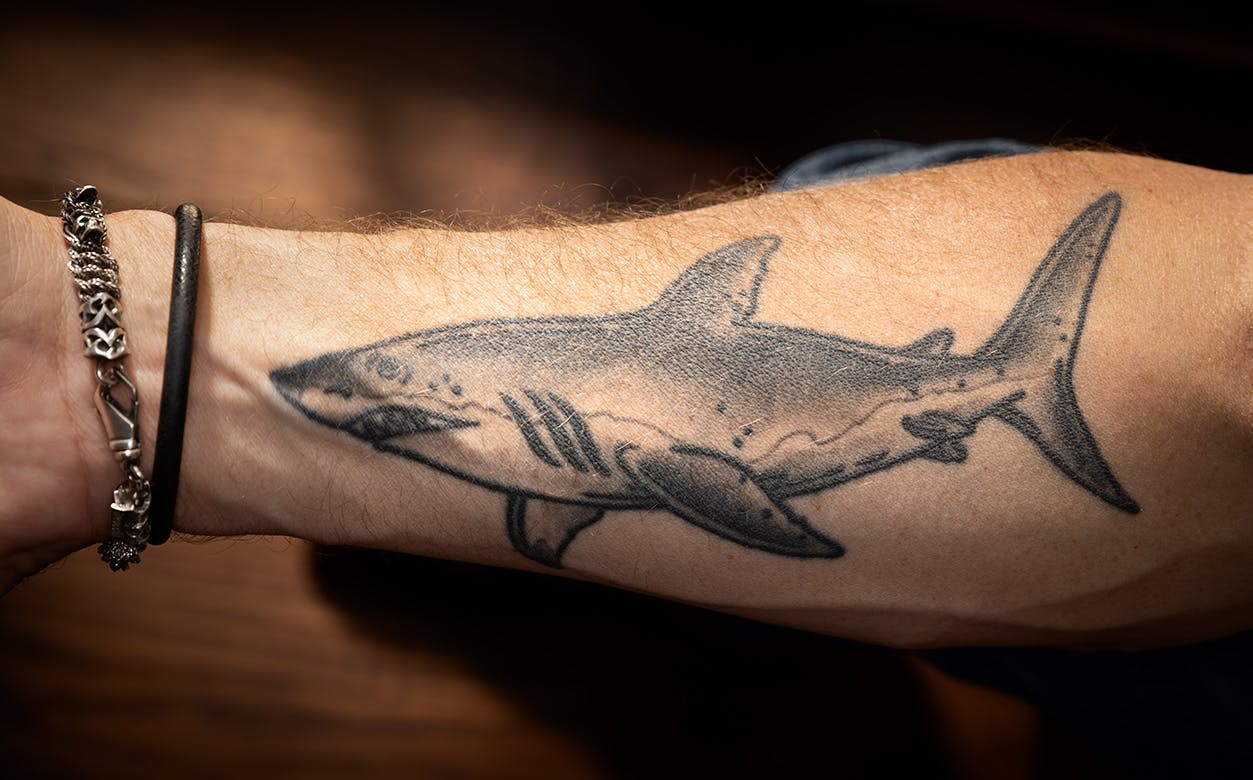
The relationship between lawyers and judges, particularly in Texas, is a dicey one. There are official rules that establish arm’s-length relations—cordial but not intimate—but that doesn’t mean lawyers don’t look for an edge, even if they have to pay for it. Decades back, there were famous poker games where some very sharp card players of the Texas Bar would manage to lose their shirts to various judges. In state courts today, where judges are elected, the edge often comes as a result of generous campaign contributions—and Buzbee is generous. Despite that long pay-to-play tradition, the stories of Tony Buzbee and his close relationship with the now-disgraced federal district judge Samuel B. Kent have left a bitter taste among many of the lawyers who spent time in Kent’s Galveston courtroom.
Appointed to the federal bench in 1990, Kent, who evoked a hungry grizzly in both his size and manner, displayed a terrifying combination of brilliance and arrogance. Early on, he made clear his distaste for long trials. Kent preferred to settle cases in his chambers, usually with a predetermined victor and award in mind. “Preferred” is the polite term for how he browbeat lawyers to play by his rules. If a lawyer didn’t like the settlement figure that Kent proposed, the judge would make it clear that he was the only one in the room with the power to grant or deny new trials. Lawyers had little choice but to go along, because Kent was the only federal judge in the Galveston district. Houston, by contrast, has thirteen.
Buzbee had clerked for Kent just out of law school and then returned to Galveston in the mid-nineties, after he left Susman & Godfrey and before he started his own firm. (He was a partner at Melancon, Hogue, and Buzbee.) It was during this period that other lawyers trying cases in Kent’s court found themselves in an odd position. As attorney Mark Stevens wrote to the Department of Justice in 2009, “Judge Kent’s evident hostility towards most lawyers was not a personal quirk, but a deliberate device whereby he ‘encouraged’ attorneys and prospective clients to employ a few favored counsel.” One of those favored was Tony Buzbee, Stevens wrote. It became known that if you wanted to win in Kent’s court, you needed to include Buzbee on your legal team—let him argue the case in front of Kent—and cut him in on the fee. For a young lawyer on the move, it was quite an advantage.
It wasn’t that Buzbee didn’t win cases elsewhere—he did. Three years after getting his law license, he had tried fourteen cases to verdict and lost just one. But Buzbee certainly cultivated his friendship with the judge, and he bragged about it. The two were so close that the Galveston County Daily News reported seeing Buzbee driving away from the courthouse in his Aston Martin with Judge Kent riding shotgun, heading for a lunch after Kent ruled that Buzbee could take the deposition of Lord John Browne, the London-based CEO of BP, in a case involving a 2005 plant explosion. Judge Kent was also allegedly a frequent visitor to the “Floridita Room,” a private bar that Buzbee had built in his Galveston office. In those visits, according to a source, Kent would proceed to get very drunk, and the women in the office learned to take cover. Buzbee says he recalls Kent being in the bar only once.
The end of Kent’s reign came in 2009, when he was sentenced to 33 months in prison for obstruction of justice related to an investigation into his sexual abuse of two employees. Buzbee takes great umbrage at the opinion of some fellow attorneys that his career was built on his relationship with Kent. “I tried to get away from Sam Kent,” he told me. He expanded his practice beyond Galveston. “Who had the five largest verdicts in Harris County in 2015? What did Sam Kent have to do with that?”
Most lawyers, even some of Buzbee’s most bitter rivals, will admit that he is very good at his job. But like many ambitious people, he has left behind a trail of former friends, colleagues, and associates who cannot stop obsessing over and analyzing him, even if they haven’t spoken to him in years. There have been lawsuits over the division of attorneys’ fees. There are former associates in his office who are still angry about Buzbee’s disrespectful behavior—he’d call them “losers” if their awards were too small. Kenneth Tekell, a defense lawyer who has the rare distinction of defeating Buzbee several times in court, is still angry about the time, years back, when Buzbee charged him with specious ethical violations and contacted local reporters to further his claims.
For a guy whose career has been built on cultivating the powerful and crushing rivals, a move into politics was natural. Like Donald Trump, Rick Perry, and most personal injury lawyers everywhere, Buzbee started out as a Democrat: he ran for the Texas Lege and lost to Republican Larry Taylor in 2002, a defeat that still rankles.
But as time went on, it became clear to Buzbee that running as a Democrat in Texas was, well, for losers. By 2013 Buzbee was close to then-governor and fellow Aggie Rick Perry, who appointed his pal to the A&M Board of Regents soon after Buzbee donated $3 million to the university. After that, Buzbee represented Perry in an ethics probe and got his client cleared, leading to an even deeper friendship.
Then came Trump. Buzbee hosted a fundraiser for the future president at his home. Then Trump’s infamous “Grab ’em by the pussy” tape was released, and Buzbee withdrew his support in a tweet: “Sorry Donald. I’m done with you. Completely.”
“Completely” lasted until the inauguration, when Buzbee pitched in $500,000. (He’d also donated $250,000 to the Trump Victory fund and $160,000 to the Republican National Committee.) Then, just last May, Buzbee was a $5,000 White Pantsuit Sponsor at a Democratic fundraiser for the Harris County Democrats—where Hillary Clinton was the speaker. “I’m buying tables at every political event,” Buzbee, the mayoral candidate, told the Texas Observer.
Because you never know when you might need an edge.
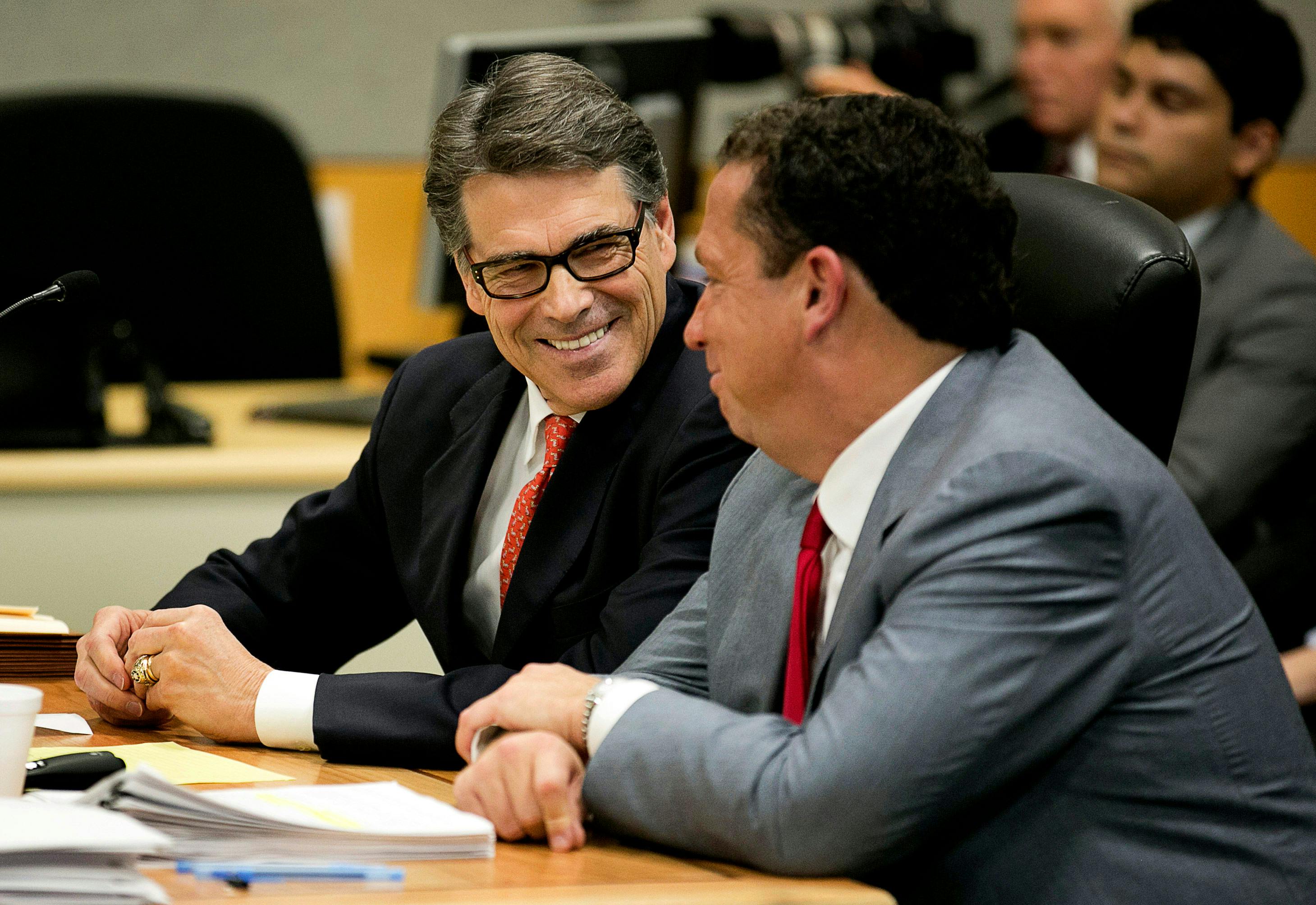
Buzbee’s competitors in the mayor’s race have been busy assembling opposition research on him. They have been mining his Facebook and Twitter accounts for damaging videos and rants, as well as his personal blog posts, which feature photos of him posed in front of a Rolls-Royce, traveling in Tanzania, and holding up an auction paddle at Christie’s.
They see some promise in Lindy Lou Layman, whose drunken, Warhol-destroying rampage went viral. (She and her lawyer aren’t talking. Buzbee will say only “I feel bad for her” and that she was a guest of another guest at his home—“but she was coming to see me.”)
Another area of interest is Buzbee’s 2016 DWI charge, damaging on its own but compounded by the fact that the DA at the time recommended Buzbee for “pretrial diversion”—probation, essentially—and that the traditionally hang-’em-high judge agreed to it, and then the district attorney personally dismissed the charge just eight months later. Not exactly man-of-the-people stuff.
Buzbee’s opponents won’t go easy on him. One video now being quietly passed around by an opposing camp shows Buzbee in his office, giddy as a five-year-old and clutching a bottle of expensive liquor as he explains how God spoke to him while he was riding on his airplane. “God told me, ‘Tony, why are you slummin’ it on this Challenger 350?’ ” he says, striding across his white carpet to pick up a cigar with his free hand. “ ‘What you need, what you need, is your own personalized 737!’ So you know what I did? I said, ‘God, I will comply!’ and I went out and bought one!” The scene really occurred, but Buzbee says he was acting out a parody of mega-wealthy preachers in preparation for a local Fox segment on exactly that subject.
Buzbee knows the stories people tell about him. He acts wounded when I ask about them—suggesting that he’s just misunderstood. “Wherever I go, people have a segment of information about me, and they don’t know who I am,” he says. But he also knows, from decades of experience, that spectacle has its uses, especially these days.
It’s a toasty summer Sunday afternoon, and Buzbee is giving me a short tour of his palatial home. When I move toward an end table to examine a photo of Trump wearing a cowboy hat, Buzbee watches, letting me linger with my assumptions before directing me to another end table, which features a picture of Buzbee with the Clintons, and one of his daughter hugging Barack Obama.
The house is perfectly appointed, sunny with gleaming oak floors and tasteful rugs and furniture. There is a Renoir farm scene and a small Rodin drawing in the living room, along with other artwork by recognizable names. Buzbee remembers some but not others. (A few forlorn-looking hooks hang in the main hallway where the burglars made off with the Monet and the Picasso.) The entry features a double-wide wood-paneled staircase that can act as bleachers during political fundraisers. Three of the world’s luckiest beagles—Lily, Lucy, and Lacy—scratch at a back door.
The sculpture of a shark and the chrome-plated hand flipping the bird were probably not put there by Buzbee’s decorator. We move into his study, which is cozy and book-lined—serene for someone who moves at Mach 1 speed, but more personal, too. Buzbee collects historical memorabilia. Here is a glass-enclosed piece of the American flag that flew over Fort McHenry in 1814, the very flag that inspired Francis Scott Key to write “The Star-Spangled Banner.” Here is a tobacco holder that belonged to FDR, and a pair of LBJ’s cufflinks. The latter president, in particular, knew how to cajole, bully, and do whatever else was needed to get his way.
Buzbee wants to stay on message, to discuss his flood plan, his plan to create a waste-free city, his plan for more police, his intention to fire the police chief. “People say I’m a fearmonger,” he says. “I’m a fact-monger.”
Maybe. By late summer he had boosted himself from near nonentity in the campaign to within 10 points of the mayor, the same as King. Buzbee had also become embroiled in a new controversy, this one involving a racially charged meme—with a photo of the black mayor and Latino fire and police chiefs being hauled away in a garbage truck driven by Buzbee. He denied any involvement in the “silly” meme but then posted it on his myriad social media platforms—and then deleted it. Welcome to the swamp.
The key question is whether Houston, which is solidly blue, will see Buzbee as a plutocrat or a populist—or, like Trump, as both. What’s not in question is that even if Buzbee doesn’t get elected mayor, by the time the election rolls around, every potential client in this city of 2.3 million and beyond will know his name. So, you see, Tony Buzbee can’t lose.
This article appears in our October 2019 issue. Subscribe today.
- More About:
- Politics & Policy
- Longreads
- Houston
